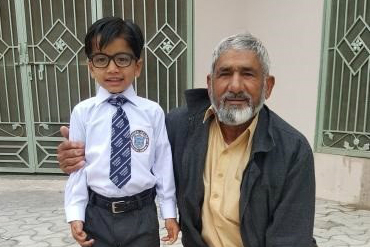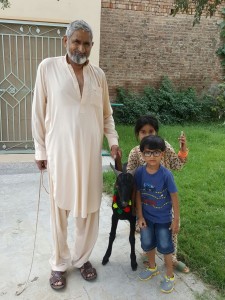Blog
Pakistan, a country without homes for older people

Saleem Malik, a human rights activist in Pakistan makes the case for grandchildren and grandparents living close to each other and caring for each other.
“Baba (grandfather) is my best friend”, said Sahil, a six year-old boy who was much weaker than his age physically and mentally, due to an unknown viral disease he got at the age of two. All his muscles were weak and he was hardly able to walk for at least a year after the attack of the disease. His schooling was also delayed. Sahil needed full time care, which was too tough for his parents due to their jobs. However there were no worries as Sahil’s 70 year-old grandfather was also living with the family.
Baba and Sahil were together for at least six to eight hours a day, everyday. They were busy all the time. Watching cartoons, playing cards, playing cricket and going to the village shop to buy sweets were the things Sahil loved doing best with his Baba. Gradually Sahil recovered his health and Baba was happy to be fully engaged with his grandson. Sahil’s doctors were astonished at his quick recovery, and put it down in large part to his grandfather’s active involvement and help. Sahil is now six, has almost gained his strength back and goes to regular school.
In the same small town in the province of Punjab, I talk with Hassan, who is a retired smart rather skinny man. “I am doing the best job of my life”, he says. He along with his wife are living on the same street as their son and two grandchildren, a boy, aged five years and the girl, aged three. They spend several hours with their grandchildren every day, whilst the mom and dad of children go to work. They watch TV, listen to stories and play in the street. The grandparents and grandchildren enjoy their lives with each other. There is no need for external ‘child-minders’ or day care.

Each of these accounts are based on real families and are very typical of the joint family, or extended family system which prevails in most parts of Pakistan. There are many variants of this in Pakistan. The best, and most beneficial is where parents live with one of their sons and his family. This is currently the most common situation. The worst and most harmful form of joint family system, which fortunately is now diminishing, is where all male siblings live together along with their wives and children. This arrangment is problematic because the freedom and independence of women suffer and personal lives of all can be negatively affected, by for example domestic violence.
It is due to extended families living close by that Pakistan has no care homes for older adults. A system of external childminders or organized day care for very young children (0 – 5 years) or for after-school care for primary school going children hardly exists. Grandparents are the main carers and educators of their grandchildren. Grandparents have much more time on their hands compared to busy working parents, and they love to spend it with their grandchildren. This is the opportunity for both parties to enjoy the company and learn from each other and become real good friends. In fact this is considered to be one of the main benefits of the joint family system in Pakistan.
It is very common that when grandparents become too old or sick they are taken care of by their grandchildren. Grandchildren do this happily, because in many cases they are emotionally attached to their grandparents due to the close bonds established in early childhood. You could even say it is better that grandchildren take care of grandparents or help their parents in nursing their grandparents, as they are young, have more energy, and do it with a lot more ease than their parents.
You might ask, what about the older adults who don’t have children? Who takes care of them in their old age? What role do they have in society? Older adults without children of their own move to their nephews’ or nieces’ homes where they are taken good care of and take on a grand-parenting role. There are many examples of this kind of relationship in the neighbourhood where I live.
Of course, there are odd exceptions, where the relationship between old people and their grown up children may not be good and where old people suffer as they miss the contact with their grandchildren. In these situations, the grandchildren also miss out – without the opportunity to learn from their grandparents. This situation is abhorred by Pakistani’s – people who do not take good care of their parents are frowned upon.
Saleem Malik is a human rights activist with focus on protection of children and women from discrimination, violence and abuse. He is from Pakistan and blogs in Urdu language. Click here to visit his Blog.